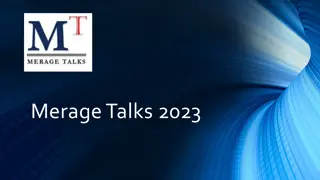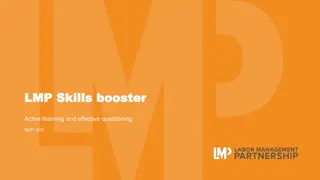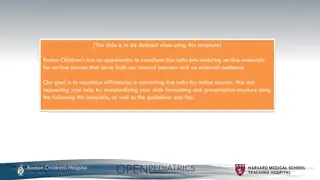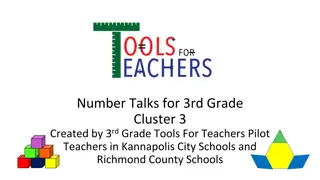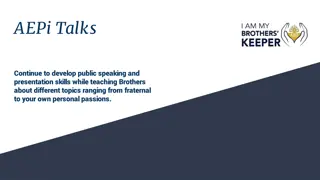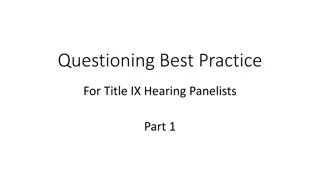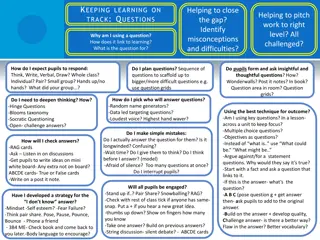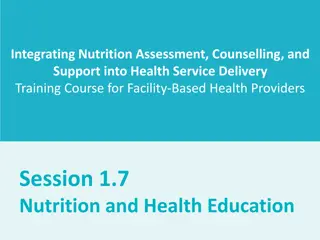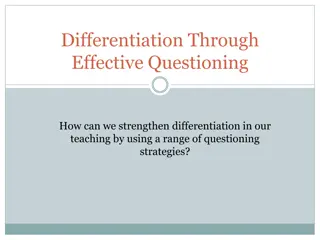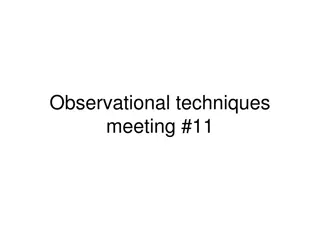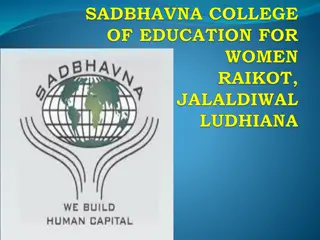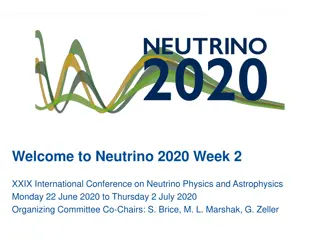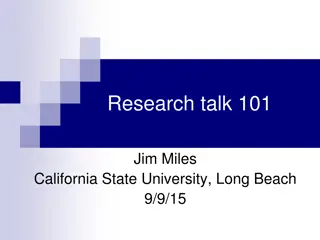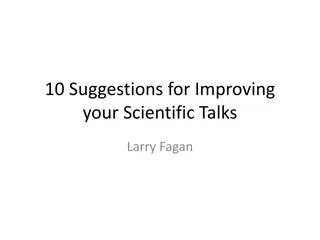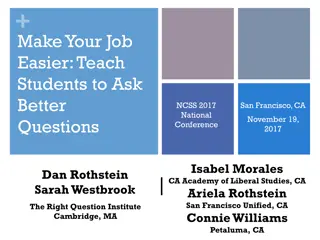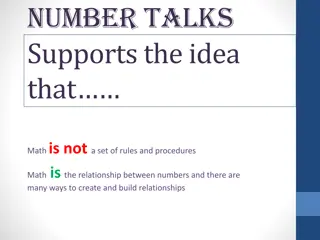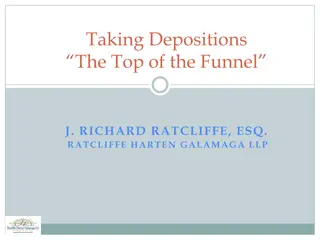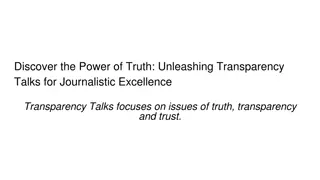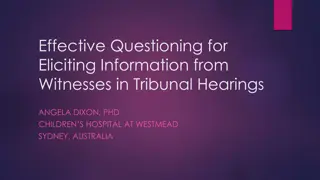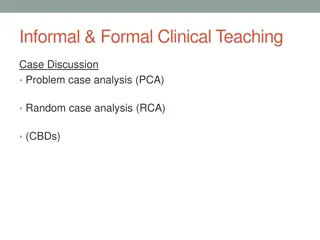Effective Questioning Techniques for Research Talks
Engaging in active Q&A sessions after a research talk is crucial for enhancing the impact of the presentation. Asking relevant questions challenges the speaker, offers solutions, and explores broader implications. Learn how to formulate good questions, come up with insightful queries, and effectively answer questions to enrich your research engagement.
Download Presentation

Please find below an Image/Link to download the presentation.
The content on the website is provided AS IS for your information and personal use only. It may not be sold, licensed, or shared on other websites without obtaining consent from the author.If you encounter any issues during the download, it is possible that the publisher has removed the file from their server.
You are allowed to download the files provided on this website for personal or commercial use, subject to the condition that they are used lawfully. All files are the property of their respective owners.
The content on the website is provided AS IS for your information and personal use only. It may not be sold, licensed, or shared on other websites without obtaining consent from the author.
E N D
Presentation Transcript
Asking (and answering) questions at a research talk Daniel Jacob
Why is it important to ask questions after a talk? Science is about active discussion of ideas symbolized by the Q&A session Your questions (and the response) increase the impact of the talk It gives you visibility you re part of the conversation, not a wallflower It exercises your creativity how does the work presented make you rethink your knowledge, think of new directions, offer ideas for the speaker? There are only three situations when I don t ask questions: Others fill the Q&A time and I don t have a Q that I feel strongly about We re out of time and a talk should never go overtime I didn t learn anything from the talk get me out of here.
What is a good question? A good question after a research talk may: 1. challenge the speaker about what they have done 2. offer possible solutions to problems raised by the speaker 3. suggest possible tests of the hypotheses/conclusions presented 4. explore potential broader implications to other problems A good question might include a statement of context that motivates the question, but keep it short and get to your question. Unlike in a pedagogical talk, the Q&A period after a research talk is not the time for questions seeking explanations or clarifications. That is best done as one-on-one follow-up.
How do I come up with a good question? Confront what the speaker presents with your own experience and knowledge. How does the talk challenge your thinking, or allow you to make connections beyond the talk? How would further work test the ideas put forth by the speaker? Doing this takes a lot of work but will also get you a lot more out of the talk. Don t worry about asking a silly question there is no negative judgment on this. Better to ask a silly question than no question at all. Don t worry about others having more important questions than yours it s up to the session chair or the speaker to pick the questions. Formulate your question in your mind during the presentation don t wait for after the talk is done and raise your hand right away. Nothing pleases a speaker more than a forest of hands raised after the talk.
How to answer questions This is a very important skill. I often see students give polished presentations and then fall apart in Q&A means that they don t really understand their topic How does one fall apart? - er, I don t know , I haven t looked at that with an air of helplessness. Follow up such a response with This is what I know , This is what I ve looked at , This is what I could try , This could be interesting Give the audience some substance. - misunderstanding the question and giving an irrelevant answer The best preparation is to have faced a similar question before generally by yourself. When preparing your talk, think hard about questions the audience may ask. Put yourself in the audience s shoes. It s an excellent exercise If you don t understand the question, you can ask the questioner to rephrase, and/or you can say something like I m not sure I understood your question, but I think you asked about Feel positive and focused about the Q&A a lot of the success has to do with confidence and attitude and being engaged and smiling.
Some Q&A etiquette Interrupting the speaker with a question during a seminar is generally inappropriate because you are breaking the speaker s train of thought, messing with time, and the answer may come later in the talk. Two exceptions: - Important and brief questions of clarification to be able to understand the rest of the talk what s shown on the x-axis? - The speaker invites you to interrupt, or pauses for questions. Don t be confrontational even if you disagree with the speaker, express the disagreement as a challenging question, and let the speaker have the last word. Don t do follow-ups unless encouraged by the speaker. As a speaker, avoid winding answers. Try to keep answers short to allow time for more questions. Repeat the question if not all the audience heard it or it s unclear. As a session chair, have a first question ready in case there are none from the audience. Don t even let time elapse if you see no hands raised say right away something like, let me take the privilege as session chair to ask the first question Don t beg for questions. A last slide that says Thanks! Questions? is embarrassing if there are no questions or if session chair won t allow them, and feels particularly silly when the presenter is not known for asking questions. I finish all my talks by saying Thank you very much for your attention . Period.
What about posters? Posters should be great for lowering the bar on questions and fostering discussion but I have not figured out the etiquette rules I feel awkward at poster sessions. Can you help me? I feel awkward standing in front of my poster with no one around I would rather mingle and look at the other posters! I m afraid of approaching a poster presenter standing in front of their poster with no one around will they hold me hostage? I m afraid of approaching a poster presenter in discussion with a group will that discussion interest me, and if not can I leave? Will the presenter switch to talk to me, which is embarrassing? I m afraid of reading a poster with no one around will the presenter show up, say let me run you through my poster and hold me hostage? I m more interested in chatting with colleagues at poster sessions which has nothing to do with the posters. The way I deal with poster sessions is to sneak in before the session when no one is around and browse through the posters, make note of the ones that I really want to know more about and then reach out to the presenters at the session which kind of works but is not very cool.
Meetings with visitors The main purpose of your meeting with visitors it is to expose them to your research they want to learn about you and what you re doing. It s OK to also engage them with questions or requests for advice, but don t make your meeting solely about that. Have the visitor get something from meeting with you. This is particularly important for students/postdocs the visitor wants to meet the young talent and hear what they re working on. There are three reasons why meeting with visitors is important: (1) it helps you practice your elevator talk. (2) the speaker may have valuable suggestions. (3) it gives you exposure. If the visitor is good they will ask probing questions about your work and maybe offer useful suggestions. 30 minutes can be too long for a one-on-one. Partner with fellow students to share a 30-minute slot. Make sure the visitors gets to know your name, your status, your academic history. If you re giving a short presentation, have your name on the first slide. Sending them a paper with a follow-up email may be appropriate.
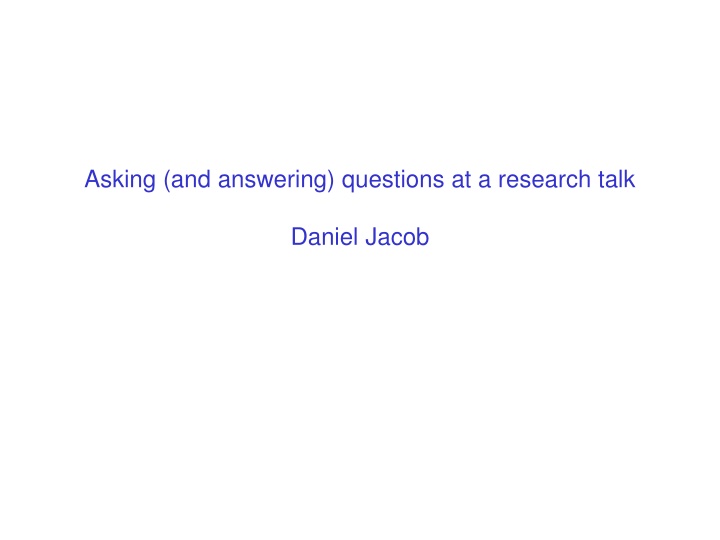

![❤[PDF]⚡ Civil War Talks: Further Reminiscences of George S. Bernard and His Fel](/thumb/20551/pdf-civil-war-talks-further-reminiscences-of-george-s-bernard-and-his-fel.jpg)
